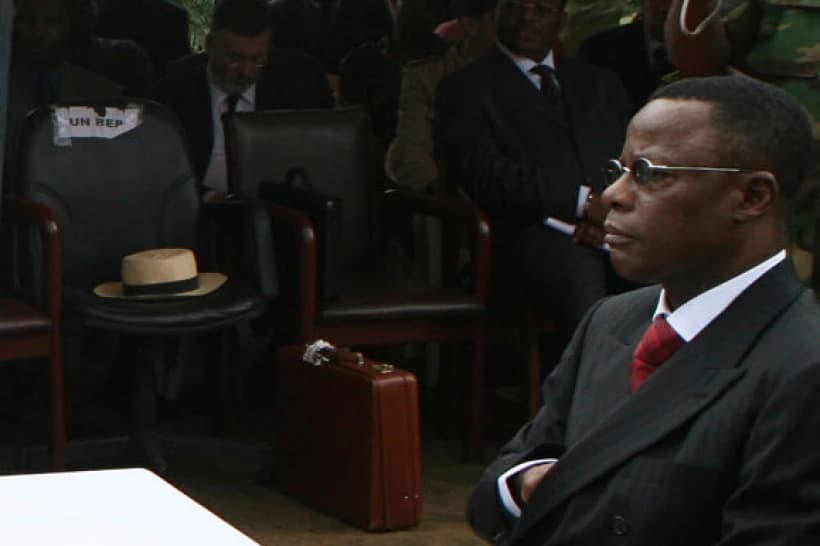YAOUNDÉ, Cameroon – A Catholic bishop in Cameroon has warned against the absence of political alternation, saying that it can only breed conflict.
Bishop Paul Lontsié-Keuné of Bafoussam was addressing Christians on July 30 in what he called a “special message” ahead of presidential election in Cameroon scheduled to take place October 12.
“Injustice can never bring peace. Electoral fraud can never bring peace. Lawlessness can never bring peace. Fear can never bring peace. The absence of political alternation prepares the ground for future conflict, not peace,” the bishop said.
It was an apparent swipe at President Paul Biya who is seeking an 8th term of office. The Cameroonian leader is now 92 years old, but 43 of those years have been as president.
“Political alternation in a democracy is a great good for a nation, for it allows for a peaceful renewal of power, prevents power from being monopolized by a single group, strengthens the legitimacy of institutions, fosters accountability among leaders, and gives citizens the sense of being truly sovereign,” said Lontsié-Keuné.
Since the introduction of multi-party politics in Cameroon in 1990, Cameroon has had five presidential elections, all of which had ended with accusations of massive fraud. In all of them, Biya was always declared winner.
The bishop’s message comes amid rising tensions after Biya’s main political rival, Prof. Maurice Kamto was barred by the elections management body ELECAM from participating in the October polls.
ELECAM rejected Kamto’s application on grounds that the MANIDEM party under which he was running had submitted multiple candidacy files – a decision widely seen by critics as politically motivated.
Lontsié-Keuné questioned the transparency of the process, suggesting it may have been manipulated to bar the president’s most formidable political foe.
Kamto has however appealed his case to the Constitutional Council-the court that that hears matters concerning electoral disputes in Cameroon.
The Bafoussam bishop has urged members of the Constitutional Council to act in truth and with their conscience to “uphold the law, and only the law” and “to deliver justice, and only justice.”
He explained that upholding the law means being “free from all political, administrative, or partisan influence, and in faithfulness to the oath they have sworn so that the people may genuinely feel that justice has been done.”
The decision to bar Kamto in the first place has attracted criticism from Human Rights Watch. In a July 29 release, the human rights advocacy organization said the decision to bar Kamto from the October 12 polls “raises concerns about the credibility of the electoral process.”
“The election commission has raised doubt on an election before the votes are even cast,” said Ilaria Allegrozzi, senior Africa researcher at Human Rights Watch.
“Excluding the most popular opponent from the electoral process will leave a shadow over whatever results are eventually announced,” she said.
Lontsié-Keuné fears that the “toxic political climate” resulting from the process could only breed conflict.
In his July 30 message, the bishop denounced an environment marked by “lies, manipulation, intimidation, fear, denial of rights, injustice, corruption, vote buying, the instrumentalization of law, and its flexible interpretation for political ends.”
However, concerns about the electoral process itself are emerging. Lontsié-Keune questioned whether postponing local elections from February 2025 to 2026 was a mere administrative adjustment or a deliberate strategic maneuver.
The postponement followed opposition leader Prof. Maurice Kamto’s call for a boycott of the polls, originally scheduled for February 2025.
Subsequently, the government introduced a clause into the electoral code stipulating that any political party must hold at least one seat on a local council or have representation in parliament to field a presidential candidate.
The effect of this new clause was immediate and specific: It disqualified Kamto’s Cameroon Renaissance Movement (CRM) from presenting a candidate in the 2025 Presidential election. Consequently, Kamto was forced to seek the presidency under the banner of a different political party, MANIDEM
The bishop also cast doubt on the legitimacy of Elections Cameroon (Elecam) and the Constitutional Council, highlighting their nearly systematic rejection of appeals and complaints.
Lontsié-Keune demanded to know whether such dismissals truly aligned with the Electoral Code’s provisions.
Furthermore, he condemned repeated attacks on public freedoms.
“We have observed systematic restrictions on the freedoms granted to citizens and political parties, alongside a shrinking public space,” the bishop stated. “These actions — accompanied by threats, intimidation, and bans — do they signal democratic anxiety or a deliberate desire to silence the population?”
Warning of rising tribalism and hate speech, particularly on social media, Lontsié-Keune emphasized that this trend dangerously deepens social fractures and reinforces a “divide and rule” dynamic.
Biya appears poised to secure another term in Cameroon’s October polls, facing a fragmented opposition that has been weakened by the absence of his strongest rival.
However, such an outcome would likely displease Cameroon’s Catholic bishops, who outlined specific leadership qualities for the nation’s next president in a March Pastoral Letter.
The bishops emphasized that the new leader must embody “integrity, humility, modesty, and moral leadership,” serving as a compass for governance. Crucially, they insisted the president must shun personal enrichment and commit to visiting every region of the country at least once during their term.
By these standards, Biya falls significantly short. Under his 43 year rule, Cameroon earned the dubious distinction of being twice named the world’s most corrupt nation — directly contradicting the call for integrity.
Furthermore, despite his decades in power, he has yet to visit all regions of the country, failing to meet the bishops’ explicit travel requirement. His leadership has also been criticized for entrenching tribalism, further undermining the moral leadership qualities the bishops deem essential.














